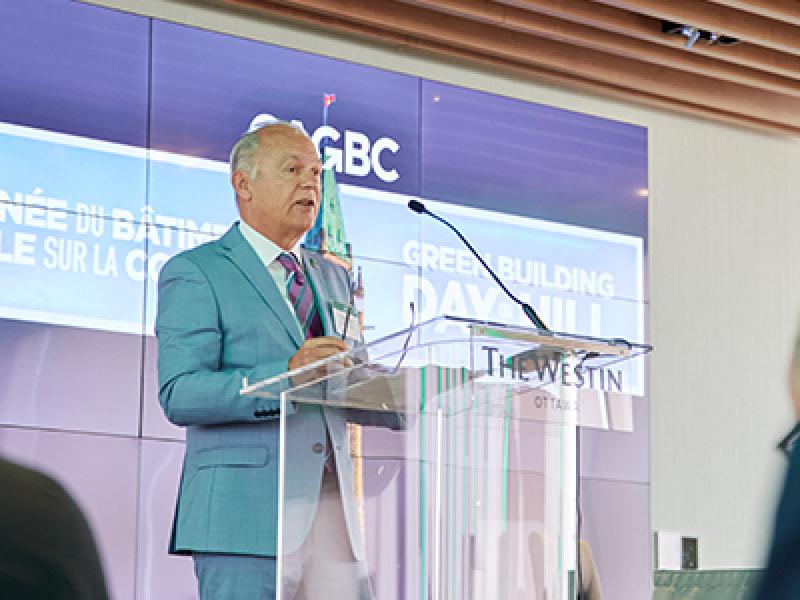
In December, the Canada Green Building Council (CAGBC) participated in the Dubai UN Climate Change Conference or COP28. Since COP26 in Glasgow, the building sector has been elevated as an area for climate action by the United Nations and associated international organizations. After a yearlong process to earn observer status, it was the first time CAGBC attended this multilateral decision-making forum on climate change.
“Participating in COP28 gives CAGBC valuable insights into the trends impacting the global building sector and how those trends will influence the Canadian market in the coming months and years,” said Thomas Mueller, President and CEO of the Council, who led CAGBC’s contingent at COP28. He shared the following high-level takeaways which will impact Canada’s real estate sector.
Buildings breakthrough
The built environment was an important focus during the ‘Multilevel Action, Urbanization and Built Environment/Transport’ day at COP28. Central to the discussion was the Buildings Breakthrough, part of a “breakthrough agenda” designed to increase international collaboration to decarbonize high-emitting sectors. This agenda will mean the building sector must make zero emission and resilient buildings the norm by 2030. Canada and 28 other nations have signed on to the Buildings Breakthrough. Participating nations will meet in Paris, France this March to define a framework and actions to decarbonize the built environment.
What does this mean for Canada? “Accelerating zero carbon buildings aligns with CAGBC’s priorities to support the market in achieving decarbonization through the Zero Carbon Building Standards,” Mueller said. “To make zero carbon buildings more mainstream, CAGBC will focus on tools and training to support retrofit transition planning at the building and portfolio level. We anticipate public and private sector support as lower carbon emissions become critical to shifting investor and regulatory requirements.”
Panelists pose for a group photo onstage after the Buildings and Construction for Sustainable Cities: New Key Partnerships for Decarbonisation, Adaptation and Resilience session during the UN Climate Change Conference COP28 at Expo City Dubai on December 6, 2023, in Dubai, United Arab Emirates. (Photo by COP28 / Mahmoud Khaled)

Cement and concrete breakthrough
The Cement and Concrete Breakthrough, co-led by Canada and the United Arab Emirates, focuses on decarbonizing cement and concrete. Globally, cement is a significant source of CO2 emissions, representing seven percent of global energy sector CO2 emissions in 2019. The Breakthrough initiative could allow Canada an opportunity to drive the adoption of low-carbon cement products and solutions, building on its Roadmap to Net-Zero Carbon Concrete by 2050.
In addition, the Forest and Climate Leader’s Partnership (FCLP) on Greening Construction announced a coalition of 17 countries, including Canada, that committed to advancing policies and approaches supporting low-carbon construction, including increasing the use of wood from sustainably managed forests in the built environment by 2030.
What does this mean for Canada?
“As the building sector looks to cut carbon emissions significantly, construction with low-carbon concrete and mass timber will be key in reducing embodied carbon,” said Mueller. “According to the International Energy (IEA), total emissions from cement need to fall by around 20 percent by 2030. A range of actions, including codes and standards, carbon capture, utilization and storage, and government support for technology and innovation, could help advance reductions. Canada’s 2025 building code integrates operational carbon emissions, and it is anticipated that the 2030 code will include embodied carbon. As a result, materials selection is becoming a critical consideration, with the federal government beginning to procure low-carbon materials, products, and services. CAGBC is working with the manufacturing sector to make low-carbon, green materials more readily available.”
Fossil fuels
Coming out of COP28, the UAE Consensus marked the first call to transition away from fossil fuels. This announcement was linked to specific targets to triple renewables and double energy efficiency rates by 2030, which will provide a significant impetus for decarbonization in the building sector.
What does this mean for Canada? “Paired with Canada’s existing climate commitments, we anticipate this statement will trigger new investment and action on energy efficiency, especially if ambitious policies follow the principles adopted in the UAE Consensus and the Buildings Breakthrough,” Mueller shared. “For Canada to meet its obligations and continue to be a global leader, it must invest in the green building sector, including in decarbonizing the construction and retrofit of large buildings and providing reliable access to a clean energy grid for electrification.”
Other trends CAGBC identified coming out of COP28 that will impact Canada’s building sector include:
· Whole-life carbon is becoming more critical, meaning the building sector must understand how to account for and reduce both operational and embodied carbon.
· Nature-based solutions, driven by the new Taskforce on Nature-related Financial Disclosures, will require industry to limit ecosystem development impacts and restore natural systems to protect biodiversity, sequester carbon, and increase resilience.
· Carbon disclosure and regulations. Financial institutions increasingly considering carbon as a value and are moving toward credible carbon accounting practices. Asset managers will need to track and report on carbon emissions alongside water, energy, and waste.
· Adaptation and resilience: Companies are being pushed by the finance sector, such as banks, insurance companies and investors, to demonstrate that their buildings consider climate risks and opportunities in alignment with ESG (Environmental, Social and, Governance) requirements.
In March, CAGBC will follow these discussions at the first-ever Buildings and Climate Global Forum in Paris, France. This forum will bring together ministers from around the world, and local authorities, NGOs, and businesses, to explore approaches to decarbonization and resilience in the real estate and construction sectors.
About the Canada Green Building Council
The Canada Green Building Council supports the building sector’s efforts to design, construct and operate buildings that eliminate environmental impacts, increase asset value and improve human health. Working with industry, CAGBC provides the training, research, services and certifications like LEED and Zero Carbon Building Standards needed for Canada’s low-carbon future.






